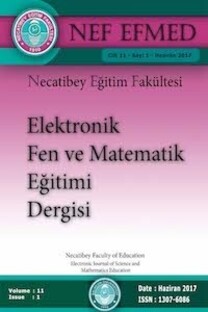Türkiye'deki Formasyon Programının İncelenmesi:Öğretmen Adaylarının Teknolojik vePedagoji kAlan Bilgisi
Investigating Teacher Certificate Program in Turkey: Prospective Teachers' Technological and Pedagogical Content Knowledge
___
- Bullough JR, R. V. ve Knowles, J. G. (1990). Becoming a teacher: Struggles of a second career beginning teacher. International Journal of Qualitative Studies in Education, 3(2), 101-112.
- Bulut, A. (2012). Investigating Perceptions Of Preservice Mathematics Teachers On Their Technological Pedagogical Content Knowledge (Tpack) Regarding Geometry (Unpublished Doctoral dissertation). Middle East Technical University, Ankara/ TURKEY.
- Chambers, D. (2002). The real world and the classroom: Second-career teachers. The Clearing House, 75(4), 212-217.
- Clark, R. E. (1983). Reconsidering research on learning from media. Review of Educational Research, 53(4), 445-459.
- Creswell, J. (2007). Qualitative inquiry and research design (2ndedition).Thousand Oaks, CA: Sage.
- Delen, I. (2014). Supporting students' scientific explanations: A case study investigating the synergy focusing on a teacher's practices when providing instruction and using mobile devices. (Unpublished doctoral dissertation). Michigan State University, East Lansing, MI.
- Erdoğan, N. ve Stuessy, C. L. (2015). Modeling successful STEM high schools in the United States: An ecology framework. International Journal of Education in Mathematics, Science and Technology, 3(1), 77-92.
- Gömleksiz, M. N. ve Fidan, E. K. (2011). Pedagojik formasyon programı öğrencilerinin web pedagojik içerik bilgisine ilişkin öz-yeterlik algı düzeyleri. Electronic Turkish Studies, 6(4), 593-620.
- Kaya, Z., Kaya, O. N. ve Emre, İ. (2013). Teknolojik pedagojik alan bilgisi (TPAB) ölçeğinin Türkçeye uyarlanması. Kuram ve Uygulamada Eğitim Bilimleri, 13(4), 2355-2377.
- Lynch, S. J., Behrend, T., Burton, E. P., & Means, B. (2013, April). Inclusive STEM-focused high schools: STEM education policy and opportunity structures. Paper presented at the annual conference of National Association for Research in Science Teaching (NARST), Rio Grande, Puerto Rico.
- Marks, R. (1990). Pedagogical content knowledge: From a mathematical case to a modified conception. Journal of TeacherEducation, 41(3), 3-11.
- Marshall, S. P. (2010). Re-imagining specialized STEM academies: Igniting and nurturing decidedly different minds, by design. Roeper Review, 32(1), 48-60.
- Mishra, P. ve Koehler, M. (2006). Technological pedagogical content knowledge: A framework for teacher knowledge. The Teachers College Record, 108(6), 1017-1054.
- Öksüz, C., Şerife, A. K. ve Sanem, U. Ç. A. (2009). İlköğretim matematik öğretiminde teknoloji kullanımına ilişkin algı ölçeği. Yüzüncü Yıl Üniversitesi Eğitim Fakültesi Dergisi, 6(1), 270-287.
- Powell, R. R. (1997). Teaching alike: A cross-case analysis of first-career and second-career beginning teachers' instructional convergence. Teaching and Teacher Education, 13(3), 341-356.
- Richardson, W. (2012). Foreword. In H. Pitler, E. R. Hubbell, & M. Kuhn (Eds.), Using technology with classroom instruction that works (pp. XV-XVI). Alexandria, VA: ASCD.
- Shulman, L. S. (1986). Those who understand: Knowledge growth in teaching. Educational Researcher, 15(2), 4-14.
- Shulman, L. S. (1987). Knowledge and teaching: Foundations of the new reform. Harvard Educational Review, 57(1), 1-23.
- Slough, S., Cavlazoğlu, B., Erdoğan, N. ve Akgün, O. (2012, March). Descriptive analysis of a sixth-grade Turkish science text with recommendations for development of future e- resources for multi-touch tablets. In P. Resta (Ed.), Proceedings of Society for Information Technology & Teacher Education International Conference 2012 (pp. 4537-4542). Chesapeake, VA: AACE.
- Tigchelaar, A., Vermunt, J. D. ve Brouwer, N. (2012). Patterns of development in second- career teachers' conceptions of learning and teaching. Teaching and Teacher Education, 28(8), 1163-1174.
- Wang, H., Hailey, D. ve Yu, P. (2011). Quality of nursing documentation and approaches to its evaluation: a mixed-method systematic review. Journal of Advanced Nursing, 67(9), 1858-1875.
- ISSN: 1307-6086
- Yayın Aralığı: 2
- Başlangıç: 2007
- Yayıncı: Balıkesir Üniv. Necatibey Eğitim Fak.
Development of Conceptions of Learning Biology Scale (CLBS): Validity and Reliability Study
Ortaokul Matematik Öğretmenlerinin Kesirlerin Öğretimine Yönelik Görüşlerinin İncelenmesi
Burçin GÖKKURT, Yasin SOYLU, Özge DEMİR
GAMZE SEZGİN SELÇUK, Serap ÇALIŞKAN, GÜLTEN ŞENDUR, KEMAL YÜRÜMEZOĞLU
Biyoloji Öğrenme Anlayışları Ölçeği'nin (BÖAÖ) Geliştirilmesi: Geçerlilik ve Güvenirlik Çalışması
Nazıl Rüya TAŞKIN, Osman YILDIRIM, Sami ÖZGÜR
Primary Students' Problem Solving Skills and Their Variation Depending on the Problem Presentation
Gül ÇOBAN ÜNAL, Serap ŞENGÖREN KAYA
Primary Students' Problem Solving Skills and Their Variation Depending on the Problem Presentation
GÜL ÜNAL ÇOBAN, Serap ŞENGÖREN KAYA
Sıcak Kavramsal Değişim İçin Öğretim: Fotoelektrik Olay Örneği
Gamze SEZGİN SELÇUK, Serap ÇALIŞKAN, Gülten ŞENDUR, Kemal YÜRÜMEZOĞLU
